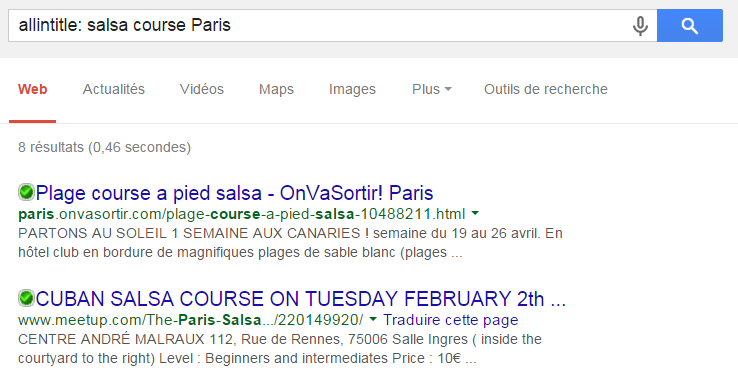Seo for dummies- simple tips to get started with your SEO
First of all, like any other good marketing campaign you need to define your goals. That is:
- Do you want people to buy some products?
- Do you want people to contact you for a service?
- Do you want them to sign up for a newsletter?
When you define your goals, you only then are you able to focus your efforts! After all, SEO is a time consuming process, and it can take up to 6 months to have good organic traffic. If you’re looking for quick conversions, try to focus on paid advertisement.
1) Basics of SEO:
You need to show to Google that your site is important. How? Well, Google knows this if it is linked to by other sites. The more important these sites are, the better it is for your ranking. The best links you can get is from websites in your industry. The more relevant a site is to your industry, the more authority you’ll have. To check the authority of a website, check out the Mozbar (for Google Chrome).
2) Technical stuff
Indexation: Google indexes your website by crawling through it. It’s Google’s method to understand what your website is about and how you’ve structured it.
Loading time: Your website needs to be fast. The longer it takes for your website to load, the more visitors will leave your web page. Your website speed should exceed 3-4 seconds. High loading time also tells Google that your website isn’t user-friendly. You can check your website speed on Pingdom .
As a tip, avoid having large images as they take time to load!
Optimizing pages and posts: There is one WordPress plugin called SEO Yoast that allows you to SEO optimize pages and posts.
XML sitemap: To be clear what your website is about, help Google understand how you have structured your page by submitting an XML map. For WordPress, try the XML sitemap wordpress plugin by google .
Mobile Friendly: Google want to make sure that the best results appear when people search for a term on Google. Your design must be adapted to a good user-experience, and your content should be of great quality. Content should also be mobile friendly. After all, more than 60% of online content is consumed on smartphones.
Headlines (H1, H2, H3..):
Google indexes websites by first analyzing the biggest chunks of information (such as page/post titles, headlines and Metatags). If you have relevant headlines in your posts, you’ll be able to communicate clearly what your pages or posts are about. This helps Google understand what you do.
For more technical information, check out this post by
Quicksprout’s
:
3) So… How do I start with SEO?
To make things clear: a keyword is the term you search for in Google. Example of keywords are:
- “salsa courses for beginners in Paris”
- “Bookstore Paris”.
When you look for keywords, you want to look for keywords opportunities that don’t have much competition. Their is little point on investing time and money where there is too much competition. It is obvious that “buy a car” is less competitive than “where to buy a red SUV Ford car in Dallas”
To check for relevant keywords, use Keyword Planner (you’ll need a Gmail account to check use it). Keyword Planner shows how many times a keyword is researched per month. It also gives synonyms to similar keywords that might be interesting for you.
While you look for opportunities, always put yourself in the shoes of people searching. Ask yourself:
- Who are they and why are they searching?
- Are they simply looking for advice or are they looking to buy something?
If you want to sell a product, there is little point focusing on Keywords that won’t convert into sales.
4) Keyword research with Keyword Planner
Keyword research can be really fun when you understand how it works. Your goal is to find keywords that are researched over 170 times a month. Whenever you have a keyword that interests you, check the competition.
5) Check your competition on a keyword
First, search allintitle: + “keyword” in Google. If keyword is salsa course Paris, then:
Allintitle shows how many have used your keyword in the page title. When this number is low, it’s a lot easier to rank for a keyword.
Second step is to activate the Mozbar on Chrome. Mozbar is a helpful tool to check your competition. It shows the Page Authority (PA) of your competitors. To check how competitive a keyword is, search that keyword in Google and then activate your
To check how competitive a keyword is, search for that keyword in Google and then activate your Mozbar. If you have 2-3 sites with less than 30 in PA, that means you can rank in the first page with some targeted work.
For salsa course Paris, competition is low, the 3rd ranked search results is already beneath 30. This is a good sign!
You can also use Keyword Planner to check your competitor’s keywords. Just insert the name of your competitor In Keyword Planner, and their keywords will normally appear as suggestions.
6) Strategy
When you’ve found a great niche with good keywords, what do you do?
First priority is to focus on great content. If your content isn’t good, Google will know because visitors are quickly leaving.
You can deploy different strategies for great content such as blog posts, videos, music lists, latest news… But your content has to be valuable for your users and readers.
There are different ways to get great content. The cheapest is write it yourself. If you don’t have time, you can outsource this part.
7) Finding great quality topics:
To find great topics for your content, there are several ways to get inspired. Forums such Quora and Reddit are great to check for what people are interested in. Google Trends is also a nice tool to see what is popular.
For forums (other than Reddit and Quora), you can search relevant forums for your keyword:
“your keyword” + powered by vbulletin
“your keyword forum”
“your keyword” + “board”
Also, check out BuzzSumo. It’s a great tool that finds content that has already performed well.
8) Link building
When you have great content, it is time to get links to your content.
To start with your SEO, you can either outsource SEO, check out how in this course . If you need good SEO work, we know very good people we can put you in contact with.
If you want to learn to do the SEO yourself, here are some strategies:
- Get in contact with other web sites that would want to feature you, and ask them to link to your website.
- Write posts, or create infographics and videos that you offer to websites in return for a link. Give away anything that would want to make them feature you! You need to be creative. When you ask to write a guest post for someone, you have to adapt your writing style and your posts to the style of the magazine. if not, they won’t want to publish your posts.
Remember to focus on websites in your industry. With time, your ultimate goal should be to get links are the sites with the most authority in your industry. E.g. If you right about sports, you might want to be featured in sports illustrated.









Leave A Comment